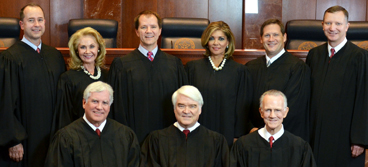(AUSTIN) – The question of mental anguish damages is once again before the Texas Supreme Court in a case brought by a man alleging a funeral home illegally cremated his mother’s body.
Cody Nelson is hoping the high court will uphold a 2016 ruling by the Eastland Court of Appeals, which held that Nelson had common law and statutory rights as next of kin to determine the disposition of his mother’s remains. That ruling reversed a Brown County trial court’s summary judgment for SCI Texas Funeral Services Inc., which did not locate Nelson before signing a contract with the siblings of Sharlene Rene Lobban, who passed away unexpectedly in October 2007. Lobban was cremated less than two days after she died.

SCI had attempted to find Nelson, who was living out of state. Nelson concedes that he was difficult to contact during that time, but had spoken by phone with his mother a week before her death. By the time an aunt reached him through a social media network, Lobban’s ashes had been scattered.
As Lobban’s only adult child, Nelson had the right under Texas law to determine the handling of his mother’s body. But nobody even knew if he was alive, said Richard B. Phillips Jr., who represented SCI in December arguments before the Supreme Court.

“The decision to move forward was driven by the family. Relatives came from out of town and there was a minor son (a 14-year-old son of Lobban’s) who needed closure,” said Phillips, a partner at the Dallas office of Thompson & Knight.
Phillips said the lower appellate court used a “legal fiction” to find a special relationship — one that would determine liability — between Nelson and the funeral home.
“The court should reverse and make clear that a special relationship requires a contract or at a minimum, an actual relationship between the parties.” Phillips said.
Why does the court need to consider whether there was a contract or special relationship when state law gives Nelson priority to make funeral arrangements, asked Justice Jeffrey Boyd.
Because Nelson is seeking only mental anguish damages, Phillips said, the court should look to its 1997 ruling in City of Tyler v. Likes. In that case the court ruled that a woman could not recover mental anguish damages, even if she could prove that the city’s culvert system flooded her home.
Nelson’s lawyer, Kirk Pittard, said the special relationship between his client and SCI was created by the statute that places an adult child second in priority to a spouse in determining disposition of a deceased person’s remains. When SCI signed a contract with Labban’s siblings after being told of Nelson’s existence, it assumed liability, he said.

If the law doesn’t have meaning, “then it’s a race down to the funeral home to see who can sign the first contract about what to do with this body,” said Pittard, of Kelly, Durham & Pittard in Dallas.
What was the cause of Nelson’s alleged mental anguish given that he acknowledged his mother wanted to be cremated, asked Boyd.
It was the timing, said Pittard, which denied Nelson the opportunity to view his mother’s body and have “a dignified and respectful opportunity for closure.”
The case is SCI Texas Funeral Services v. Cody Nelson No. 16-0297.
